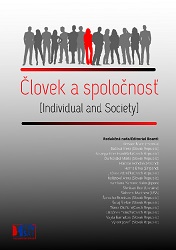Social Skills for Paramedics in Slovakia
Social Skills for Paramedics in Slovakia
Author(s): Zuzana KaššaiováSubject(s): Cognitive Psychology, Psychology of Self, Behaviorism, Health and medicine and law, Human Resources in Economy
Published by: Spoločenskovedný ústav SAV, Slovenská akadémia vied
Keywords: Social skills; Competencies; Non-technical skills; Paramedics;
Summary/Abstract: In the past, patient safety has attracted attention. However, little of it has been focused on the social skills necessary for paramedics. The aim of this article is to both highlight this deficiency, as well as the importance of examining such social skills which are necessary for crews in the emergency medical services. In this review, we present different terms described in the literature, and also the two most prevalent approaches: a non-technical skills approach and a competency approach. The non-technical skills approach has its origin in aviation. Flin et al. (2003) defined non-technical skills as the cognitive and social skills that complement technical skills, and contribute to safe and efficient task performance. Non-technical skills are divided into three main categories: cognitive (decision-making and situational awareness), personal awareness (coping with fatigue and stress) and social skills (leadership, communication and teamwork). Each category includes basic elements and behavioral markers – examples of effective and non-effective behaviors. The competency approach defines competencies as knowledge, skills, abilities and other characteristics or as a cluster of two or more these attributes (Marrelli, Tondora, & Hoge, 2005). Each competency is composed of behavioral indicators – specific descriptions of effective behavior (Calhoun et al., 2008). The literature describes three clusters of competencies: 1. cognitive competencies (system thinking and pattern recognition), 2. emotional competencies (self-awareness, self-management, emotional self-awareness, emotional self-control), 3. social competencies (social awareness, relationship management such as empathy and teamwork) (Boyatzis & Boyatzis, 2008). In this article, we discuss the differences and similarities of both approaches and we focus on their critique. Nestel et al. (2011) criticized the term of non-technical skills and recommended using the term human factors because human factors positively define skills or behavior. According to the authors, while the term of non-technical skills is simplistic and inaccurate, human factors stem from a richer academic tradition. The model of non-technical skills can contribute to the development of negative attitudes and devaluation in that these skills cannot be learned, and the spread of attitudes that there are two broad, independent categories. The critique of competency models is based on theoretical ambiguities. Some definitions describe competencies as a combination of knowledge, skills, ability and other characteristics (Campion & Odman, 2011) or as a summary of beliefs, motives, and attitudes needed for successful work (Chen & Naquin, 2006). Another critique is based on the lack of methodological rigour, and according to some authors (Ashworth & Saxton, 2006), the term of competence ignores wider human qualities and focus on the measurement of performance according to predetermined standards. Despite the advantages and disadvantages of both approaches, the urgency of this topic in Slovakia is emphasized by the increasing number of publicized cases of medical failure. While there are general categories of nontechnical skills and competency models for healthcare professionals (such as nurses and doctors), there is a lack of studies which focus on paramedics. According to Glavin and Maran (2003), specific methods cannot always be transferred from one culture to another. It is not possible to take a specific training package and replace the word nurse or physician with the word paramedic. It is necessary to develop a theory of human skills (or competencies) and to identify job-specific skills for the position, and related behavioral markers. Additionally, the knowledge of social skills in emergency medical services is important for preventing errors and dealing with critical situations.
Journal: Človek a spoločnosť
- Issue Year: 23/2020
- Issue No: 2
- Page Range: 29-42
- Page Count: 14
- Language: English

